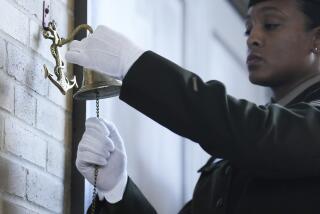No Racial Bias in 2 Probes, Army Rules
- Share via
WASHINGTON — Allegations of racial bias against the Army’s criminal investigators in two recent cases “were without merit,” the service reported Friday after a seven-month investigation by its inspector general.
The allegations were raised during the Army Criminal Investigative Command’s study of sexual misconduct at Aberdeen Proving Ground, Md., in 1997, and during the Army’s court-martial of former Sergeant Major of the Army Gene McKinney.
In its statement, the Army said:
“After a rigorous investigation, the Inspector General found that neither investigation was racially motivated. . . . The Army Criminal Investigation Command investigators vigorously investigated the sexual misconduct allegations in an attempt to find the truth. In those isolated instances where standard investigative procedures were not followed, appropriate corrective action has or will be taken,” an Army statement said.
At the time of the Aberdeen scandal, the NAACP held a news conference at which five women Army recruits said that military investigators tried to pressure them into making false claims that they had been raped by their superiors at Aberdeen.
McKinney’s attorney also argued at one point that, if his client were white and an officer, he would have been quietly retired rather than court-martialed.
Ultimately, McKinney was acquitted of sexual misconduct but found guilty of one count of obstruction of justice and demoted one rank to master sergeant.
The investigations at Aberdeen, about 40 miles north of Baltimore, resulted in charges against 12 black drill instructors accused of forcing female subordinates to have sex.
One instructor was cleared and the remaining 11 were either convicted or resigned rather than face courts-martial.
The inquiry was conducted by five officers, including a black male lieutenant colonel and a white female major, who gathered statements, case files and sworn testimony from 88 “key individuals” from the Aberdeen scandal, the largest criminal investigation in Army history.
More to Read
Sign up for Essential California
The most important California stories and recommendations in your inbox every morning.
You may occasionally receive promotional content from the Los Angeles Times.










